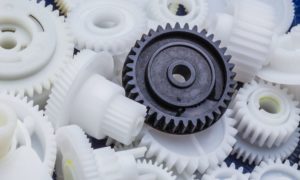There is such a diversity of material whenever you consider using plastic polymers. However, what is more impressive is their unique ability to adapt to so many different instances of work. There are special blends of unique plastics that manufacturers have created for the sole purpose of using them as gears in the industrial field. These include polyacetal or POM and polyphenylene sulfide or PPS.
These are two huge giants in the industry of plastic gears that make millions of businesses thrive through their magnificent work and resiliency. There are many different abilities that certain plastics hold as well, as we will discuss later in this piece. Here, we have compiled a comparison of materials used to make plastic gears so that you can have a better look at how plastics help construct our world.
Different Categories of Gear Plastics
Many businesses generally use crystalline plastics for polymer production when in context with plastic gears. They use these plastics because of their sheer reliability while operating. It’s important to note that they have minimal shrinkage while molding, which is the key to their success.
If they can resist forces that generate heat, pressure, and resistance, they will likely hold their own over a long period. This is important when working in an industrial setting. Therefore, they are perfect for these tasks.
Other examples of plastics we already know well include nylon (POM) and polyphenylene sulfide (PPS). They are two of the most commonly used polymers that make up industrial gears. When you take both nylon and polyester and blend them, bonding them with polyacetal, they provide their own natural lubrication. This can help when using them as industrial gears.
This solves the problem of overheating and greasing that you would normally have with metal alloys of any kind. But especially for those big, heavy, metal gears that often overheat and burn off a lot of grease in the process. So this is ultimately a great trade-off, at half the weight or less.
You can add thermoplastic polyesters to the list of polymers that are great for this function because they can accept massive amounts of heat without being affected. They are much more resistant and resilient than nylon, which has been the top competitor for some time.
Linear polyphenylene sulfides have an even higher temperature and chemical resistance than thermoplastics and nylon. Also, long fiber plastics are on a similar level of resistance where they can resist shrinking, heat, chemical exposure and keep their form while being put under heavy loads.
Why Choose Plastics
There are many reasons why you might choose plastics for your business. They serve industrial settings extremely well because you can easily produce them from resins provided by custom gear manufacturers that would otherwise have no use. So they save money and make money all at once. Here is a list of more specifics to explain why the industrial sectors that use gears favor plastics.
Unique Design
When you process a polymer, you can start off with only one type of polymer and form your gear. That will result in a gear with a specialized property characteristic most of the time, like resistance to tension and pressure or heat and corrosion resistance. But the more that you blend different plastics, the more characteristics the final gear will have. This makes your gear stronger and more durable. Therefore, you can design them however you see fit.
Value
Plastics come from petroleum as a by-product that manufacturers would normally dispose of as waste. However, due to the discovery and invention of plastics, they now keep these materials and use them to create this new material. So this helps in the production and cost, making it easily accessible. Also, it comes at an affordable price due to these reasons.
Sound Levels
Because of the low levels of density, plastics don’t tend to resonate as well as harder materials like alloys would. Therefore, they make factories and industries practically soundproofed. This makes for a much nicer workspace if you work inside factories and industries with these gears. Their soundproofing qualities make these gears highly sought after.
Effectiveness
Due to their sheer hardiness and long life, it’s hard to find another material that costs so little and does everything you would expect it to do and more. For example, plastics have fire retarded properties, corrosion resistance, and strength. This material does everything you need it to with little to no complications.
Natural Protectants
By blending some of the polymers together, scientists have figured out that they can protect themselves from extreme pressures and heat under tension. Plus, with this property available, there is no need to lubricate gears made from polymers because they are self-lubricating. This makes them well worth the little money spent for a product that virtually takes care of itself! What other materials on the market can hold such a bold claim and perform up to specifications like this? None!
There is so much to say about plastic polymers and the long-lasting negative effect they have had on the planet; however, they deserve some level of redemption to get their credit where it is due. In lines of long, exhaustive production, plastic polymers have reinvented how we look at manufacturing and industry today.
They save us money and provide us with services that would normally take much more time and effort. Plus, they do it with their sheer ability to adapt to any test you put them up to. There are very few instances of other materials that can work so hard for so little. We should praise them for their ingenuity and ability to provide as they do.
Hopefully, this comparison of materials used to make plastic gears has helped you understand the importance of using plastics in gear making. Plus, you’ve learned the fullness of what they can provide and how well they work. Now, you hopefully have a glimpse of what they can do for us in the future. Who knows what the future holds?




